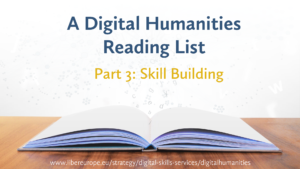A Digital Humanities Reading List: Part 3

LIBER’s Digital Humanities & Digital Cultural Heritage Working Group is gathering literature for libraries with an interest in digital humanities.
Four teams, each with a specific focus, have assembled a list of must-read papers, articles and reports. The recommendations in this article (the third in the series) have been assembled by the team in charge of enhancing skills in the field of digital humanities for librarians, led by Caleb Derven of the University of Limerick.
- Digital Humanities Reading List: Part 1
- Digital Humanities Reading List: Part 2
- Digital Humanities Reading List: Part 4
The Third Theme: Skill Building
The recommended readings and tutorials in this post broadly focus on what skills are needed for providing DH services in libraries and how library staff can acquire these skills.
In the case of the former, we examined resources that resonated as representative or evocative of what skills library staff might obtain allowing them to participate in digital humanities work or practices. With the latter, we’ve highlighted a few skills tutorials that provide practical instruction in useful tools and skills for DH practice. Of course, given the sheer plurality of both web-accessible and published resources, this posting highlights a sampling of what’s available. The Working Group’s Zotero library, and items specifically related to skill building within libraries, offers a surfeit of additional starting places.
- Coding for Librarians: Learning by ExampleThe Digital in the Humanities, Andromeda Yelton
This issue of Library Technology Reports examines the contexts of, the motivations for, and concrete examples of coding in libraries. The chapters in the issue are notable for the range of libraries represented (albeit in primarily North American settings), from public to special to academic libraries. The chapters carefully describe not only the what of coding (specific tools or approaches used, the problems addressed by the coding, etc.) but also why librarians should code, and through exploring political and social dimensions of coding, outlines a sort of ethics of coding in libraries. The issue makes a strong case for the active role of the librarian in the creation of the digital library. - Using Open Refine to Create XML Records for Wikimedia Batch Upload Tool: Nora McGregor
Many of us working in DH or digital library projects that involve any level of metadata clean-up, data munging or data transformations have likely encountered Open Refine, a veritable panacea for many data related issues. This blog post from the British Library’s Digital Scholarship department provides a comprehensive and detailed description of a specific approach to uploading collection metadata to Wikimedia Commons using Open Refine as a core tool. The post highlights openness as both platform and tool. - Digital Humanities Clinics – Leading Dutch Librarians into DH: Lotte Wilms, Michiel Cock, Ben Companjen
This article describes a series of DH clinics run in academic and research libraries in the Netherlands aimed towards enabling library professionals to provide services to students and researchers, identify skill gaps and provide identifiable solutions and to assist in automating daily work, echoing themes in the Library Technology Reports issue noted above. The librarians involved in the project ran five DH Clinics in 2017 and found that the model of training collections librarians interested in DH all at once worked very well, as you not only get the training part in order, but also put a network in place. - Programming Historian
As our first suggestion for DH-related tutorials, the Programming Historian provides 68 lessons in a wide range of open skills, technologies and tools, from a variety of disciplinary perspectives, related to many data and content areas that librarians work with in DH contexts. The site covers a broad range of use cases that strongly reverberate with library DH work, from visualisation to textual analysis to GIS and mapping contexts and digital publishing. - Library Carpentry: What Is Library Carpentry?
Building on the lessons and approach of Software Carpentry and Data Carpentry, Library Carpentry could be viewed as an essential prologue before embarking on the deep dives of the Programming Historian lessons. The tools detailed in Library Carpentry’s lessons form the core of the work undertaken in many of the resources noted in this post. - British Library Digital Scholarship Training Programme
This collection of courses provided by the British Library is aimed at librarians to provide them with an understanding of Digital Scholarship and to develop the necessary skills to deliver DH-related services. Links are provided to all the slides and resources used in the training. The tools and approaches are consonant with resources noted above.
The Skill-building team of the Working Group will be providing additional posts in the coming months that highlight both specific use cases faced in LIBER institutions and potential challenges in providing DH services.
To find out more about the team and LIBER’s work in this area, see the Digital Humanities & Digital Cultural Heritage Working Group page.
Related news articles